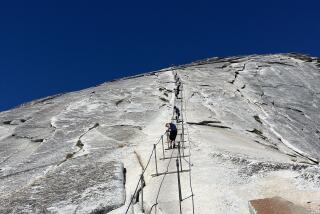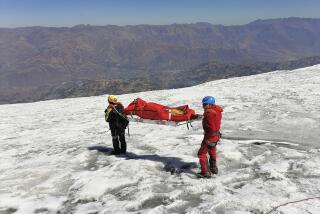DUMPING GROUNDS : Climbers Contend That Some Remote Wilderness Areas Need a Mass Cleanup Effort
SNOWBIRD, Utah â Glenn Porzak, president of the American Alpine Club, offered a travel tip during the recent Mountain Summit: âIf you want a wilderness experience, donât go to Mt. Everest.â
The thrust of the symposium was concern shared by some of the worldâs top mountaineers and rock climbers for their deteriorating environment.
Reinhold Messner, an Italian mountaineer, was aghast at plans to build cable cars across Mt. Olympus in Greece.
Lynn Hill, the worldâs best woman rock climber, told of a runaway tendency in her exploding sport to âchip a hole if they reach a place they think is impossible to climb. People should be adapting to the environment rather than making the environment fit their needs.â
Franceâs Jean-Claude Droyer said: âTheyâre turning natural rocks into gymnasiums.â
Michael Hill of the U.S. National Park Service said that until recent cleanup efforts, Alaskaâs Mt. McKinley was so bad that a person could collect the discarded equipment and âequip an expedition to anywhere in the world.â
Darrell Knuffke, acting director of the Wilderness Society, said: âWeâre a people under siege from ourselves.â
Several spoke of trash along the Khumbu Glacier, the main route to Everest and one-third of the Himalayas.
Whom to blame?
John Roskelley, Americaâs top Himalayan climber, said, âIt isnât the trekkers that deposit garbage. Climbers, yes--(empty oxygen) bottles, boots, rope.â
Lou Whittaker, who with his twin brother Jim has led Himalayan expeditions for years, said: âIn the 60s weâd go in and we would litter. Weâd throw bottles around because we didnât think about those things back then . . . didnât think anybody else would ever be there.â
Later, Whittaker said, he has disciplined his own teams and worked with Nepalese officials to educate the natives about littering.
âWe tell âem theyâre hired on the basis of keeping the trail clean and wonât be paid if they donât,â Whittaker said.
On one expedition, he said, âWe hired 80 porters to carry (our trash) out. It cost us a lot of money and we wound up $40,000 in the hole, but we left it clean.â
Sir Edmund Hillary, who with Sherpa guide Tenzing Norgay was the first to ascend Everest in 1953, last year proposed a five-year moratorium on expeditions to allow the mountains to regenerate.
But others doubt it would work. The bacteria that break down human trash and body waste are not effective above 17,000 feet, so even biodegradable material lingers indefinitely.
Another problem is the yaks--beasts of burden--that bring in the equipment and remain to graze out the upper meadows.
âI was there in â79 and weâd camp in meadows,â Jeff Lowe said. âNow itâs mud or dust.â
He has suggested that the yaks be employed not only to carry supplies in but to carry trash out. Roskelley, who likes to travel light, proposed that the local governments charge duty for excess gear brought in by large expeditions.
Since the mid-70s, Whittaker said, he has seen cypress trees felled along the way by the native porters for firewood, although many expeditions were starting to bring in kerosene and propane for cooking.
âWe made some suggestions that they not burn the forests,â Whittaker said.
But Roskelley questioned how foreigners could tell the natives not to burn their own wood.
âThatâs their right, these people whose culture depends on burning that wood,â he said.
Porzak, who visited the Khumbu last year, said there are just too many people entering the valley either to trek or climb these days.
âI was blown away by the number of new lodges and tea houses that have been built there since I was last there in â81,â he said.
Bob McConnell is a leader of the Everest Environmental Expedition that plans to go into the valley next year to collect trash and install refuse collection centers.
Messner, creator of the âWhite Wildernessâ concept, said the ultimate solution is a matter of education on both sides.
âWe have to have some places where human beings are not the center of the world,â he said, âwhere nature is the center. People in Pakistan, in Nepal and other places are not thinking about what theyâre losing.â
More to Read
Sign up for The Wild
Weâll help you find the best places to hike, bike and run, as well as the perfect silent spots for meditation and yoga.
You may occasionally receive promotional content from the Los Angeles Times.






